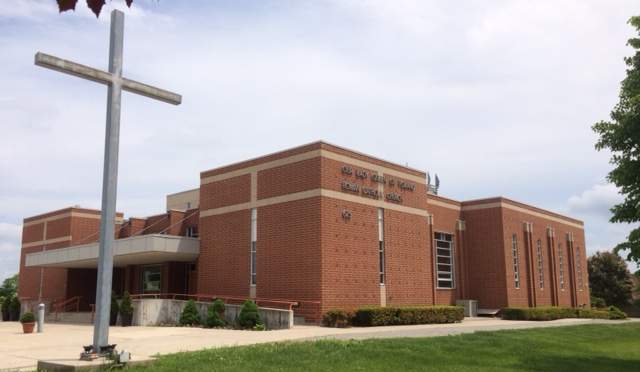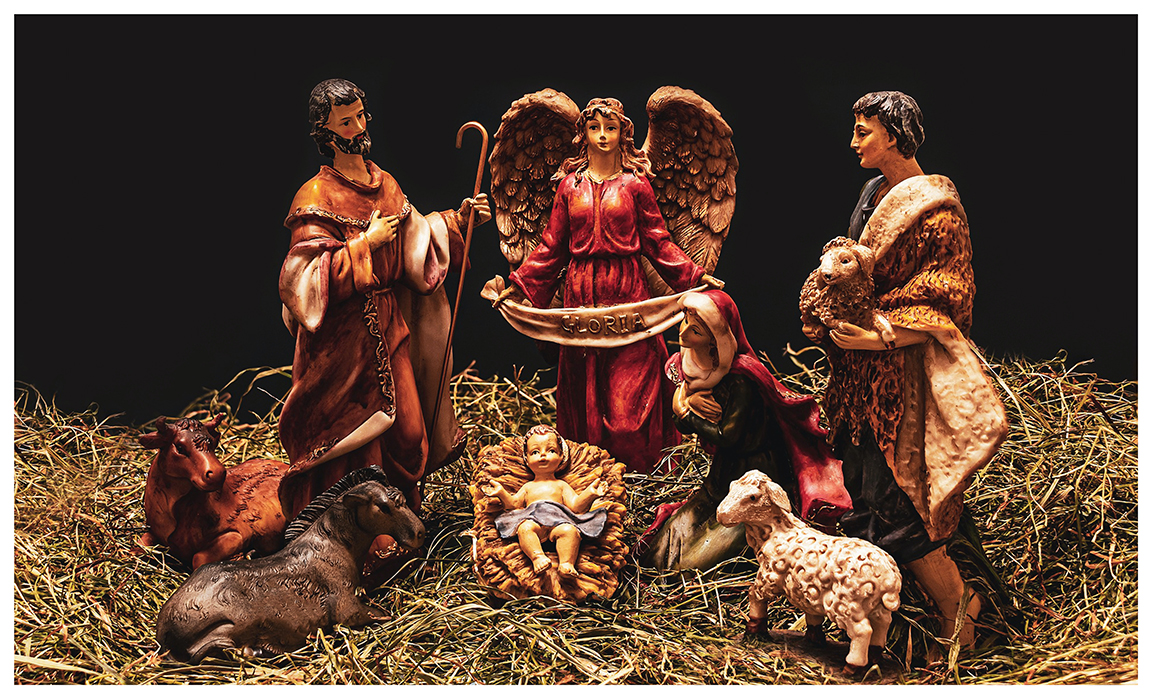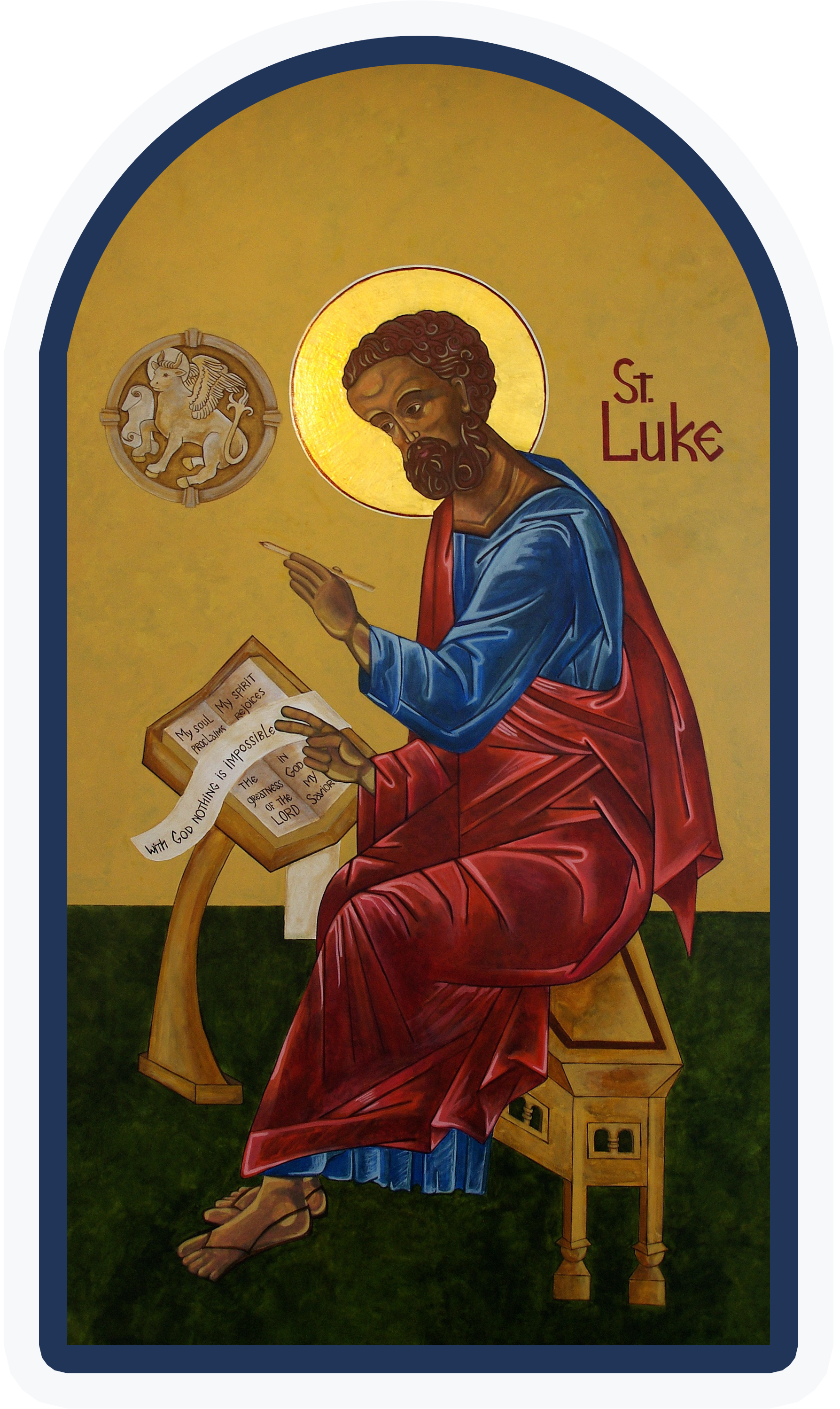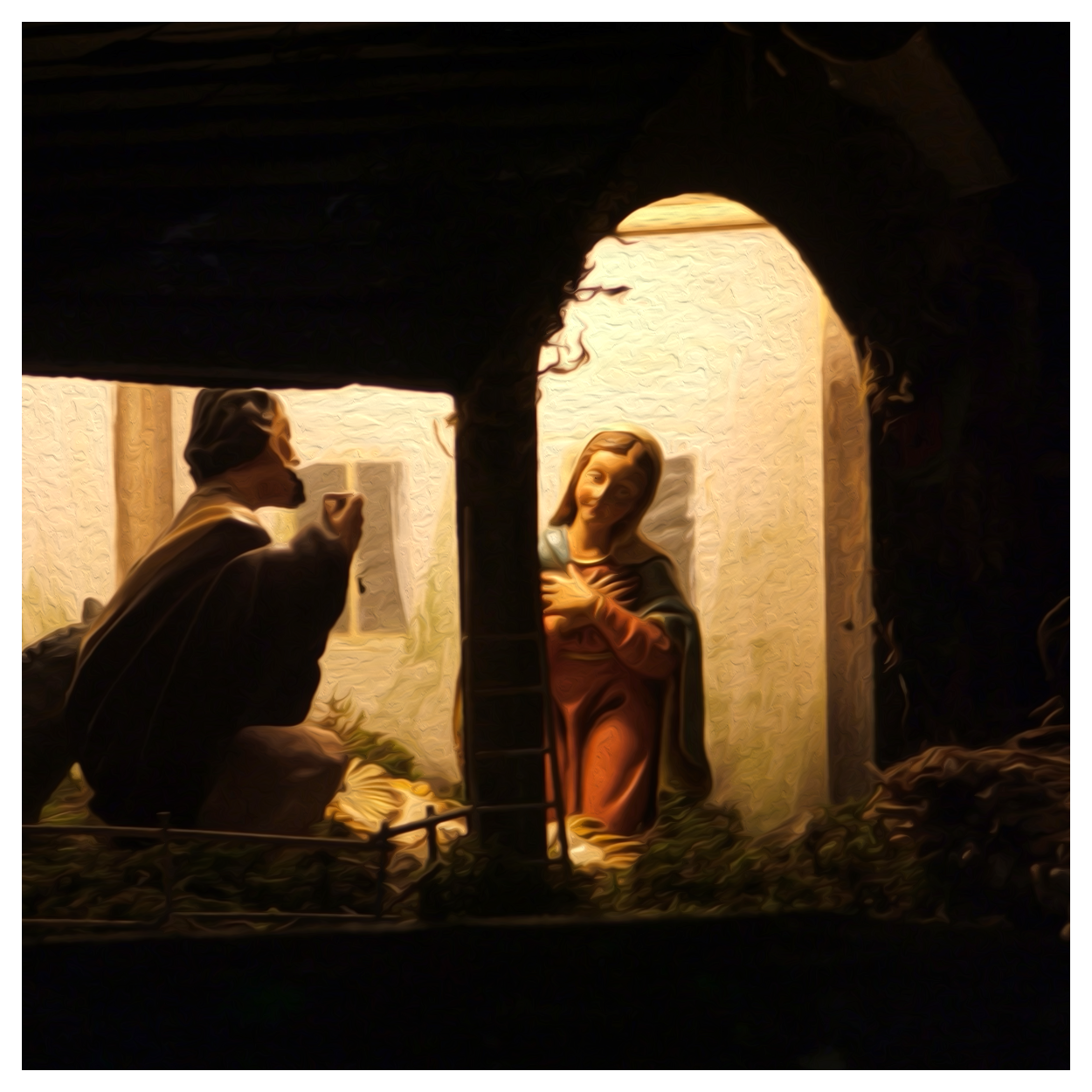
Glory to God in the Highest and on Earth Peace to Those on Whom His Favour Rests
This reflection based on the readings for Christmas Mass at Night—Isaiah 9:1-6; Psalm 96; Titus 2:11-14 and Luke 2: 1-14; and for Christmas Mass during the Day—Isaiah 52: 7-10; Psalm 98; Hebrews 1:1-6; and John 1: 1-18.

There is a beautiful tension that exists in the readings that we hear proclaimed at the various Christmas Masses that are celebrated at different times during the day. On the one hand, at the Masses celebrated in the evening, we hear the Gospel of Luke proclaimed and of the birth of the child Jesus into the poverty of a manger in Bethlehem. On the other hand, at Mass during the day, we listen to the Gospel of John and are told that the eternal Word who has existed for all time, and was with the Father at the creation of the world, became man. This tension is best expressed by the beautiful proclamation of the angels to the shepherds in a nearby field to whom they announced the Good News of the Saviour’s birth, with the words: “Glory to God in the highest (heaven) and on earth peace to those on whom his favour rests” (Luke 2:14). Because this tension continues to be a reality in our own faith lives today, it is worth reflecting upon it this Christmas.
 The Evangelist Luke is an historian and he wishes to tell us the story of the real events that took place surrounding the birth of Christ. The author of the Gospel of Luke and the Acts of the Apostles, Luke wants to convey to us the gritty reality of the Incarnation of the Son of God. His message is that God became one of us and lived in the reality of our time and space. As he will develop the story of Christ’s coming into the story of the early life of the Church in the Acts of the Apostles, the Evangelist Luke communicates to us that this same Saviour, who was born two thousand years ago, continues to come to us in the reality of our own lives, through the Eucharist and the sacramental life of the Church. In order to communicate the reality of Christ’s entering our time and space, Luke is very precise in presenting the details of Christ’s birth and the historical realities of this time. It is Luke who tells us that these events took place during the reign of Caesar Augustus, while Quirinius was govern of Syria. A census of the Roman Empire required Mary and Joseph to return to Bethlehem, and it was for this reason that Christ was born in that city. As so many people had also returned to Bethlehem to be registered for the census, there was nowhere for the couple to stay at a time when Mary was about to give birth to the Saviour. We are told that as a result of this temporary housing crisis, Jesus was born in a manger in the poverty of a barn. Into the most dire of circumstances in His time, Jesus the Son of God, entered our world to become Emmanuel, God with us.
The Evangelist Luke is an historian and he wishes to tell us the story of the real events that took place surrounding the birth of Christ. The author of the Gospel of Luke and the Acts of the Apostles, Luke wants to convey to us the gritty reality of the Incarnation of the Son of God. His message is that God became one of us and lived in the reality of our time and space. As he will develop the story of Christ’s coming into the story of the early life of the Church in the Acts of the Apostles, the Evangelist Luke communicates to us that this same Saviour, who was born two thousand years ago, continues to come to us in the reality of our own lives, through the Eucharist and the sacramental life of the Church. In order to communicate the reality of Christ’s entering our time and space, Luke is very precise in presenting the details of Christ’s birth and the historical realities of this time. It is Luke who tells us that these events took place during the reign of Caesar Augustus, while Quirinius was govern of Syria. A census of the Roman Empire required Mary and Joseph to return to Bethlehem, and it was for this reason that Christ was born in that city. As so many people had also returned to Bethlehem to be registered for the census, there was nowhere for the couple to stay at a time when Mary was about to give birth to the Saviour. We are told that as a result of this temporary housing crisis, Jesus was born in a manger in the poverty of a barn. Into the most dire of circumstances in His time, Jesus the Son of God, entered our world to become Emmanuel, God with us.
Luke’s very precise telling of this story of the birth of the Messiah is told with so much historical detail so that we might understand the reality that this same Jesus wishes to enter our lives and our time today. As the world was unsettled at the time of Christ, so it is today. Although the names of the political powers who attempt to control the world have changed, we still see the effect of the turmoil that they cause. In Christ’s time, the Holy Land was divided by differing powers, as it is today. As the challenges of homelessness confronted the Holy Family at the time of Christ’s birth, in our own cities we too witness the reality of so many of our brothers and sisters struggling to find security and housing in a terribly difficult economy. God sent His only begotten Son to be born into the reality of time and space so that we too might know of His presence with us in our reality and space today.
In his book on the Jesus of Nazareth, The Nativity Narratives, Pope Benedict VXI emphasized the very significant choice on God’s part of the birth of Jesus taking place in a manger in Bethlehem. The meaning of this city in Hebrew is “Beit” or “House” and “Lechem” meaning “Bread,” to have the significance “House of Bread.” Jesus, who will later identify Himself as the “bread of life,” who will give eternal life to all who consume Him, is born in a city that is known as the “house of bread.” This Eucharistic imagery is further developed by the fact that Jesus is born in a manger, that place in which the animals found their food and nourishment. The child born there, in the city named “house of bread,” will feed all of God’s people with His Body and Blood so that they might know life-eternal. The Good News of this Eucharistic imagery is that this same Saviour, who entered into the history of our time and space in Bethlehem, wishes to enter into our lives, stories and time and space today. The child that was born in Bethlehem is the same Lord who comes to us in the Sacrament of His Body and Blood in the Eucharist. The Christmas message not only proclaims the birth of Christ in Bethlehem two thousand years ago; it also proclaims that Emmanuel, God with us, remains with us in the reality of our time and space today. This is such an important part of our Christian faith. In the aftermath of the recent global health crisis, so many of us have become comfortable with a virtual life. Many no longer relate to real people or belong to real communities. Sadly, people now feel very comfortable doing everything online; even attending Mass in virtual communities where they never encounter real people. The problem with this is that it removes us from the real encounter with God that Jesus came to make possible through His Incarnation. It is only by actually receiving Christ in the Eucharist that we truly allow Him to be born into our lives today and fulfill the reality of His presence through which He has promised us eternal life. Christ was not born virtually and cannot enter our lives virtually. As He was really born to be present to us, we must be truly present to Him in order for Him to enter our time and space and be our Saviour today.
"This same Saviour, who entered into the history of our time and space in Bethlehem, wishes to enter into our lives, stories and time and space today."
This connection between the birth of Christ in Bethlehem at His first coming, and His coming again to us today in the reality of our time and space in the gift of His Body and Blood in the Eucharist, is beautifully illustrated in the many churches today that place the manger scene in front of the altar. The connection between the altar and manger shows that as Christ was born into the poverty of the manger to save all people, so too He has chosen to come to all people in the gift of the Eucharist in order that He might be present to all people today. Jesus entered time and space as a child born into the manger in Bethlehem so that He might conquer all time and enter the reality of our lives today through the Sacrament of the Eucharist and always be present to us. In the Sacrament of His Body and Blood, Jesus remains Emmanuel, God with us today.
The Gospel of John approaches Jesus’ incarnation from the theological identity of who Jesus is. John tells us that Jesus is the eternal Word who has been with the Father since the dawn of time—in the beginning He was. John tells us that Jesus is the eternal Word who has entered time and dwelt among us. It is because of who Jesus is that He is able to be with us today and to give us the eternal life that is promised to those who eat His Body and drink His Blood. The conclusion of the Gospel of John proclaims to us the reason why Christ is able to be the source of our peace and remain present with us. The Christ child is the Son of God who has destroyed death and breathed out His Spirit on the Church that it might proclaim His resurrection and ongoing presence to all people. As the Risen Christ appears to His frightened disciples in the days following Easter, He asks them for something to eat to show that He has a real body and declares that His peace is with them. His peace is a peace that comes from being in the presence of the eternal Son of God who has power over death. Christ’s disciples will still have trials and difficulties, they will still suffer persecution, but they will be accompanied by the presence of the living God who has promised them eternal life. Jesus, the Son of God, is able to be present to them through the realities of their time and space, because He is God and has conquered death. As He appears to them, He breaks bread with them and extends His peace to them. It is in this way that they come to know the peace proclaimed by the angels from the God on high to the men and women who open their hearts to His presence. When you and I receive the Eucharist, Christ comes to us in the reality of our time and space so that we might know His peace today. It is for this reason, that each time we celebrate Mass, and He is present in our midst in the Sacrament of His Body and Blood on the altar, that we are invited to share in His peace today. Jesus really enters our lives today through our celebration of the Eucharist, as we do from Sunday to Sunday what He commanded us to do in memory of Him. The same Christ who was born in the manger in Bethlehem, because He is the Son of God, has the power and authority to come to us today, in the midst of the reality of our time and space, that we might know the same peace that was declared to the shepherds at His first coming on Christmas Day.
 At all of the Masses this Christmas, and at every Sunday Mass, you and I are invited to sing the words of the angels as they announced the coming of Christ to the Shepherds. The “Gloria” that is sung at the beginning of Mass puts into our mouths the words of the angels as we prepare for the coming of Christ during the Mass in the celebration of the Eucharist. At our Christmas Masses, the Evangelist Luke wants us to know that as Christ really came to be among us on the first Christmas in Bethlehem, so too He truly enters into our history today through the Sacraments and real life of our Christian communities. From a more theological approach, John proclaims through his Gospel that Jesus has the power to do this because He is the eternal Word of God made flesh. On Christmas Day, and in every celebration of the Eucharist, heaven and earth meet and the men and women of today are invited to know the true presence of Jesus Christ, the Word made flesh.
At all of the Masses this Christmas, and at every Sunday Mass, you and I are invited to sing the words of the angels as they announced the coming of Christ to the Shepherds. The “Gloria” that is sung at the beginning of Mass puts into our mouths the words of the angels as we prepare for the coming of Christ during the Mass in the celebration of the Eucharist. At our Christmas Masses, the Evangelist Luke wants us to know that as Christ really came to be among us on the first Christmas in Bethlehem, so too He truly enters into our history today through the Sacraments and real life of our Christian communities. From a more theological approach, John proclaims through his Gospel that Jesus has the power to do this because He is the eternal Word of God made flesh. On Christmas Day, and in every celebration of the Eucharist, heaven and earth meet and the men and women of today are invited to know the true presence of Jesus Christ, the Word made flesh.
Christ’s first coming really did happen. Jesus really comes to us today in the celebration of the Mass in the Sacrament of His Body and Blood. He invites us to be really present to His coming into the reality of our time and space by being really present to Him in our parish communities of faith at the Sunday Eucharist. Christmas celebrates Christ’s real coming and dwelling among us. His love and presence are real. There is nothing virtual about the Incarnation. His real love and true presence demand a real presence from us at the Sunday Eucharist. There is nothing virtual about Christ and His love. This Christmas, we are called to recognize there can be nothing virtual to our response.
I pray that this Christmas, as we experience the real presence of God’s love for us today, we may resolve to be really present to Him as He comes to us today in the Eucharist and in our brothers and sisters in need.
May the living and truly present God grant all of you a blessed Christmas and happy 2024.
Merry Christmas!
Fr. Michael McGourty is Pastor of St. Peter’s Church in downtown Toronto.
